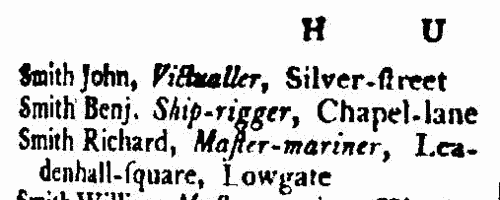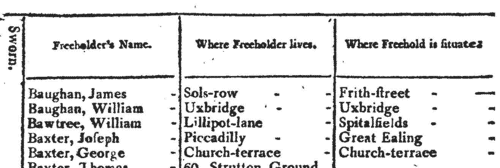Add this eBook to your basket to receive access to all 118 records. Our indexes include entries for the spelling medland. In the period you have requested, we have the following 118 records (displaying 11 to 20): These sample scans are from the original record. You will get scans of the full pages or articles where the surname you searched for has been found. Your web browser may prevent the sample windows from opening; in this case please change your browser settings to allow pop-up windows from this site.  Apprentices registered at Exeter
(1758) Apprentices registered at Exeter
(1758)
Apprenticeship indentures and clerks' articles were subject to a 6d or 12d per pound stamp duty: the registers of the payments usually give the master's trade, address, and occupation, and the apprentice's name, as well as details of the date and length of the apprenticeship. There are central registers for collections of the stamp duty in London, as well as returns from collectors in the provinces. These collectors generally received duty just from their own county, but sometimes from further afield. The indentures themselves can date from a year or two earlier than this return. (The sample entry shown on this scan is taken from a Bristol return. Each entry has two scans, the other being the facing page with the details of the indenture, length of service, and payment of duty.) IR 1/53 | Sample scan, click to enlarge

|  Masters of Apprentices
(1769) Masters of Apprentices
(1769)
Apprenticeship indentures and clerks' articles were subject to a 6d or 12d per pound stamp duty (late payment of the 6d rate attracted double duty (D D) of 12d): the registers of the payments usually give the master's trade, address, and occupation, and the apprentice's name, as well as details of the date and length of the apprenticeship. 2 January to 31 December 1769. | Sample scan, click to enlarge

|  Apprentices
(1771) Apprentices
(1771)
Apprenticeship indentures and clerks' articles were subject to a 6d or 12d per pound stamp duty (late payment of the 6d rate attracted double duty (D D) of 12d): the registers of the payments usually give the master's trade, address, and occupation, and the apprentice's name, as well as details of the date and length of the apprenticeship. 18 March to 31 December 1771. | Sample scan, click to enlarge

|  Masters of apprentices and clerks
(1789) Masters of apprentices and clerks
(1789)
Apprenticeship indentures and clerks' articles were subject to a 6d or 12d per pound stamp duty: the registers of the payments usually give the master's trade, address, and occupation, and the apprentice's name, as well as details of the date and length of the apprenticeship. 2 January to 31 December 1789. IR 1/34 | Sample scan, click to enlarge

|  Masters of apprentices and clerks
(1791) Masters of apprentices and clerks
(1791)
Apprenticeship indentures and clerks' articles were subject to a 6d or 12d per pound stamp duty: the registers of the payments usually give the master's trade, address, and occupation, and the apprentice's name, as well as details of the date and length of the apprenticeship. 5 March to 31 December 1791. IR 1/35 | Sample scan, click to enlarge

| Inhabitants of Hatherleigh in Devon
(1790-1797)
The provincial sections of the Universal British Directory include lists of gentry and traders from each town and the surrounding countryside, with names of local surgeons, lawyers, postmasters, carriers, &c. (the sample scan here is from the section for Hull). The directory started publication in 1791, but was not completed for some years, and the provincial lists, sent in by local agents, can date back as early as 1790 and as late as 1797.
| Sample scan, click to enlarge

| Freeholder voters in Middlesex
(1802)
A poll to elect two knights of the shire to represent the county of Middlesex, was held at Brentford 13 to 29 July 1802. The electors were the adult male freeholders of more than 40s per annum of real estate. This poll book lists the voters alphabetically by surname, giving christian name, abode, where the freehold was situate, the nature of the freehold (such as messuage, house, land, rent-charge &c.), the occupier's name, and whether the freeholder voted for William Mainwaring, George Byng or sir Francis Burdett. The entries are printed across facing pages, of which this sample shows part of a lefthand page. For each name indexed, the matching pair of scans is provided. This is the index to the freeholders.
| Sample scan, click to enlarge

|  Masters of apprentices and clerks
(1804) Masters of apprentices and clerks
(1804)
Apprenticeship indentures and clerks' articles were subject to a 6d or 12d per pound stamp duty: the registers of the payments usually give the master's trade, address, and occupation, and the apprentice's name, as well as details of the date and length of the apprenticeship. 2 January to 31 December 1804. IR 1/39 | Sample scan, click to enlarge

| London Traders
(1814)
The fifteenth edition of The Post-Office Annual Directory includes this 'List of More than 17,000 Merchants, Traders, &c. of London, and Parts Adjacent', arranged alphabetically by surname, with trade in italics, and address. | Sample scan, click to enlarge

| Shoreditch Refuge for the Destitute: Subscribers
(1815)
The Refuge for the Destitute, Middlesex House, Hackney Road, Shoreditch, was supported by donations and subscriptions. This list of subscribers, correct to 1 April 1815, lists all donations, as well as subscriptions received in the previous year, the names being arranged by initial letter of surname or title, then in order of precedence, with nobility, gentry, and then commoners in alphabetical order, often with an address. On the right-hand side of each page there are two columns, the first being for donations (in pounds and shillings), the other for annual subscriptions (usually of a guinea). A donation of ten guines or more qualified the donor as a Governor for Life: these are indicated by an asterisk in front of the name. C indicates a member of the committee; S, having served as a steward; V.P. a vice-president.
The object of this society was, to provide a place of refuge for persons discharged from prisons, or the hulks, unfortunate and deserted females, and others, who from loss of character, or extreme indigence, could not procure an honest maintenance though willing to work; also, in cases of very urgent necessity, to afford temporary relief to distressed persons, until parochial or other assistance could be obtained, 'and thereby to put an end to the plea of necessity urged by many of the idle, disorderly and profligate characters that infest our streets'.
| Sample scan, click to enlarge

|
Research your ancestry, family history, genealogy and one-name study by direct access to original records and archives indexed by surname.
|












